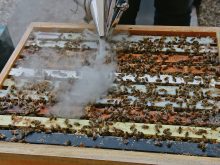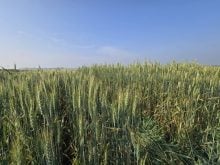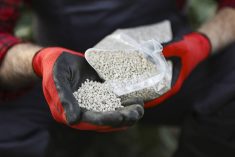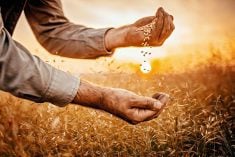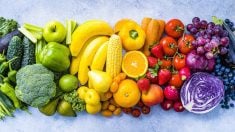Don’t be like Europe.
That was the message to farmers during a keynote speech at this year’s CropConnect Conference in Winnipeg in mid-February.
“The European approach in general is that, ‘We have gotten things absolutely right,’” said speaker Bill Wirtz. “Essentially, ‘You have no idea what you’re doing. It’s only us.’”
Read Also

Manitoba sunflower plant gets local owners
Scoular’s sunflower and bird feed plant in Winkler, Man., bought by Orenda Commodity Services Ltd. out of Ste. Agathe.
“When have millions of Europeans ever been wrong?” he added, to audience laughter.
Why it matters: European farmers have chafed under the bloc’s strict environmental regulations and policies, which have sparked protests in several countries.
Wirtz, originally from Luxembourg, is a senior policy analyst with the think tank Consumer Choice Center. His organization has been critical of European Union authorities, including EU food and agricultural policies.

Environmental policy, which Wirtz described as frequently driven by ideology, has made life difficult for farmers and threatens the European food system, he said.
For instance, he said, agricultural chemicals are severely restricted in Europe and bans have created chaos and uncertainty for farmers.
He pointed to the hit that French sugar beet growers suffered in 2020, when poor weather and pests (particularly the aphid-spread yellow virus) saw yields drop 26 per cent, according to the European Association of Sugar Manufacturers. The EU in general saw 11 per cent fewer sugar beets that year.
”Managing the infestation was made difficult by recent restrictions on the use of neonicotinoid products used to control the aphids that transmit the virus,” the association said in their 2020-2021 statistics report.
To alleviate financial pressures, French authorities allowed an exemption from the ban for up to three years. The country had been planning to let that exemption stand for 2023, Reuters later reported, but the EU pumped the brakes.
An alternative chemical was proposed, Wirtz said. Then that chemical was also banned.
“As a farmer, you don’t really know by the time of the next harvest which chemicals you’re still allowed to use,” he said.
Farmers could switch to organic, he said, but many European consumers—particularly those in poorer nations—don’t want to pay those premium prices for food.
Pushes to reduce greenhouse gas emissions have also caused friction. Wirtz gave the example of the Netherlands’ efforts to reduce emissions by reducing agricultural production.
In 2019, the Netherlands re-evaluated its procedures around nitrogen emissions. A report on the matter laid out, among other things, agriculture’s issues with nitrogen emissions, wrote Arjen Siegmann in an October 2024 article for the policy journal European View.
A remark by a Dutch politician suggesting livestock should be cut back 50 per cent was “perceived as an affront to all farmers in the Netherlands,” said Siegmann, and kicked off protests in the fall of 2019.
In a bid to reduce emissions from livestock, Dutch government offered a voluntary buy-out of farms, Wirtz said. Some farmers took the deal, but most didn’t. Some of those farms had been producing gouda cheese “longer than this country exists that we’re currently in,” Wirtz said.
Suggestions that buyouts might become involuntary led to further, expansive protests.
Media savvy farmers and farm group representatives were able to articulate the problems they faced and how they ought to be solved, and they got public sympathy on their side, said Wirtz.
While Dutch farmers have continued to protest environmental regulation and other grievances, the protest movement also bolstered the Farmer–Citizen Movement (in Dutch, the BoerBurgerBeweging, or BBB), a right-leaning, populist party, to gain seats in the Dutch provincial and national governments, and then the European Parliament, Siegmann wrote.

Farmers in other countries like France, Poland and Germany also resorted to large protests on issues like low farm income, cheap imports and fuel taxes. These have led the EU to back down on some policies.
For instance, in early 2024, the EU reduced some environmental requirements tied to farm subsidies. This month, Reuters reported the EU was drafting plans to further simplify rules related to subsidies.
The EU’s ombudsman also launched an inquiry in September into last year’s changes after NGOs complained that EU law was breached when officials failed to carry out a climate assessment before making the changes.
Lessons for Canada
Europe’s Farm to Fork strategy was lauded for its ambitious environmental targets, but now portions are quietly being rolled back, Wirtz said.
He also pointed to a 2020 USDA study, which estimated that if the EU farmers adopted the stated input reduction targets, production would drop seven to 12 per cent. The strategy could also increase global food prices by anywhere from nine to 89 per cent, depending on how many non-EU countries also adopt the strategy, the agency said.
Canadians should be skeptical of any politician who says a policy is already set in stone in Europe, Wirtz said.
“Ask the follow-up question: How did it turn out for Europe? What did they do as a result?”
He also suggested taking new sustainability programs and road maps seriously, being mindful that what is voluntary now may not be in the future.
Pushing back against new protectionism is also important, he said, as is upholding scientific independence.
He referenced Robert F. Kennedy, Jr., the newly-minted secretary of the U.S. Department of Health and Human Services, who is well known for controversial views on health and food.
“Canada might very well be the only developed nation left that upholds a scientific standard in which the agencies are doing their work properly on the assessment of crop protection chemicals,” said Wirtz.
He added that his interaction with Canadian agriculture and global affairs officials have been positive and called their knowledge “fairly impressive.”
He said there is political will to enact what bureaucrats know is lacking.
“We need to use innovation as a tool,” he said.
“The way that farming is more consolidated and uses modern technology is not just more efficient, but as a result of its efficiency, is also more sustainable.”






